Insights from a Study Abroad Intern in Madrid, Spain, on a Successful International Internship Experience
Pursuing an internship abroad could be compared to skydiving: stepping out of a plane (scary) in search of an exhilarating experience (awesome). As nerve-wracking as it may be, it’s undeniably one of the best ways to prove to yourself and others (future employers included) your status as a high-achiever and many other attractive traits.
Choosing to seek this path demonstrates motivation and ambition. Adapting to life in the host culture, from transportation methods to second language skills, recognizing your strengths and weaknesses to promote growth, and ultimately conquering the experience means you were able to build success for yourself—an important trait for living a fruitful life!
As I settle into my internship position in Madrid, a marketing role at an interior design school/studio called Artes Creativas, I have already begun to accumulate some useful lessons. Now I share them with you, potential future interns, to provide an understanding of how to maximize the value of this once-in-a-lifetime opportunity and what skills you’ll be sharpening along the way.
1. Mastering the Art of Commuting
Public transportation, who? One of the biggest differences between my convenient life at my home university in Southern California and that of my time abroad in Madrid is how I move from place to place. In the States, I rely on my trusty Volkswagen Jetta to transport me where I want to go when I want to go there. Unfortunately, my vehicle didn’t make the cut on the packing list, so I’ve been resorting to other forms of transportation since being overseas. In fact, it’s not just me and the other international students who are without private wheels; a heavy reliance on various forms of public transportation, namely buses and metros, is utilized by almost the entire population of Madrid.
CEA CAPA helps you set up a transport card from the get-go that can be loaded with unlimited trips for (at time of writing) an affordable monthly rate of €8. Compared to what gas prices have been hovering at in the US, this is a huge money saver, allowing more funds to be put toward memorable food and experiences! Additionally, the buses and metros are quite clean and accessible.
The biggest adaptation in this department relates to scheduling. Prompt arrivals require greater planning and in general, more time must be allotted to travel from point A to point B. Be sure to plan in extra minutes in case there are any delays, missed transfers, or mistakes made along the way. This is a necessary adjustment to demonstrate to your host company your maturity and professionalism. It’s quite easy once you get the hang of it (especially with the initial assistance of Google Maps). You’ll be feeling, and moving, like a local in no time.
Skills sharpened: Responsibility, Time Management, Punctuality
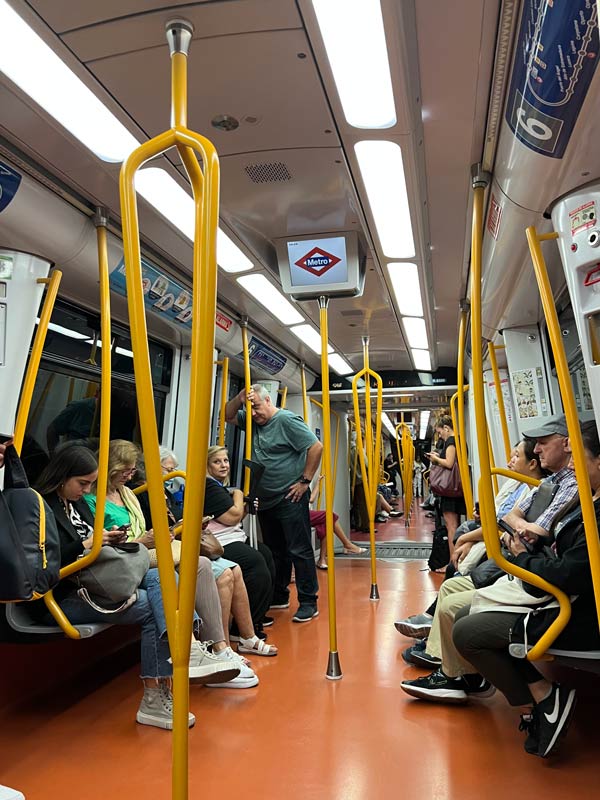
Riding the Metro is the go-to method of Madrileños for getting from place to place.
2. Share What You Know, Learn What You Don’t
Point-blank, you’re going to feel out of your element. There will be a steep learning curve and likely some bumps to overcome, especially if interning at a placement where English isn’t the predominant language. While I have been studying Spanish for many years, I feel there is still room for improvement in my conversational abilities. Because of this, I chose to pursue an internship that’s carried out completely in Spanish in hopes that it will finally seal the deal of my fluency.
Each day I rely on my solid foundation of language skills, though an onslaught of new vocabulary and concepts means I don’t always comprehend every bit of information (of this my supervisor is very understanding). While it definitely adds an element of difficulty, ultimately the Spanish placement is leading me toward achieving my goals and intentions.
A new culture also introduces many local customs that may come as a shock, such as a kiss on each cheek (which is actually more of a cheek touch accompanied by a kissing sound) when meeting your supervisor, as is the typical Spanish greeting.
In a work setting, this could also mean the utilization of novel websites or software, new methods of appealing to the local target market, or variations in the hours of a typical workday. But this is why you’re doing the internship, isn’t it? Developing a grasp on a new culture’s ways through this unique, imitable professional experience will be a handy addition to your toolkit.
That all being said, you’re also going to have great insights to share from knowledge acquired in relevant courses, age-related insights, or simply a fresh perspective. After taking a multitude of business courses at my university in the US, many of which were specifically focused on marketing, I have shared plenty of wisdom with Artes Creativas. I applied my knowledge of SEO and keywords to help with the visibility of the business online, though not all that I’ve imparted to the company has been academic intelligence. In fact, I taught my manager how to add a link to an Instagram story, allowing viewers to click and be redirected to our website or course catalog. This was simply a know-how I attained from being a typical Gen-Z social media user. Don’t be afraid to share your expertise!
Skills sharpened: Humility, Intercultural Collaboration, Open-mindedness, Application of Skills
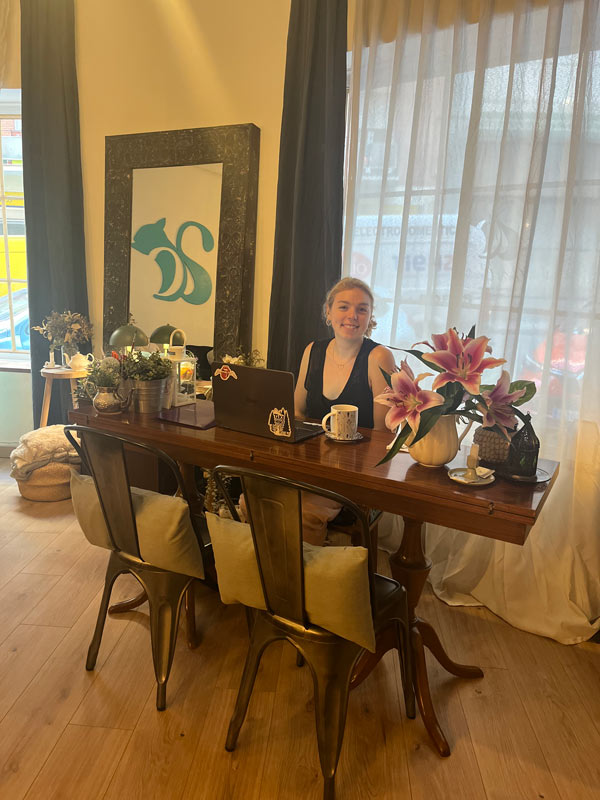
I’ve settled into my workstation at our cozy office in the center of Madrid, though some days I’ll instead sit by my manager to collaborate on projects.
3. Be Proactive
In the professional realm of the United States, tasks and deadlines are typically conveyed in a very direct manner. The business practices of a foreign country are likely to differ. Though it depends on the industry and unique culture of each company, interns may find themselves lacking direction or sufficient assignments. Instead of resorting to unrelated projects (like homework) or constantly requiring instruction from a superior, be proactive.
Of course, it’s typical to require higher levels of guidance during the first few weeks in a new position, but once an understanding of the scope of work is developed, one can be more proactive. Practicing this skill may include drafting text for a future newsletter or investigating a related topic you may need more knowledge on.
Since my placement business offers courses in various disciplines of art, my supervisor is commonly working with a student while I’m in the office. I have practiced proactivity during these times of independence by designing future social media posts in Canva and researching Google Ad functions for greater understanding. Upon returning to the atmosphere of stricter target dates and concise communications in the States, being proactive will make you stand out. This recommendation is just one example of a way you will benefit from adapting to and learning from your host culture. Maybe you’ll adapt so much that you won’t even want to go back home!
Skills sharpened: Curiosity, Motivation, Independence
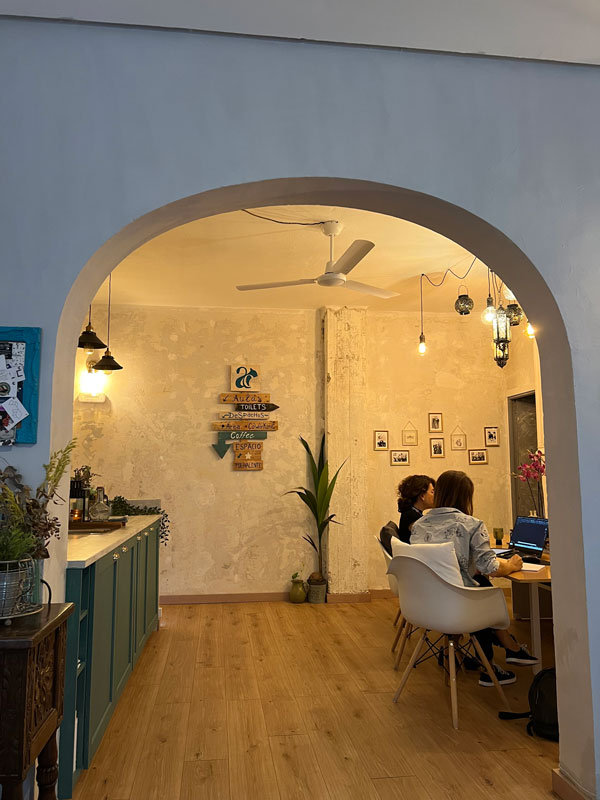
While my supervisor works with a student, I focus on my tasks and practice proactivity when I finish with these assignments.
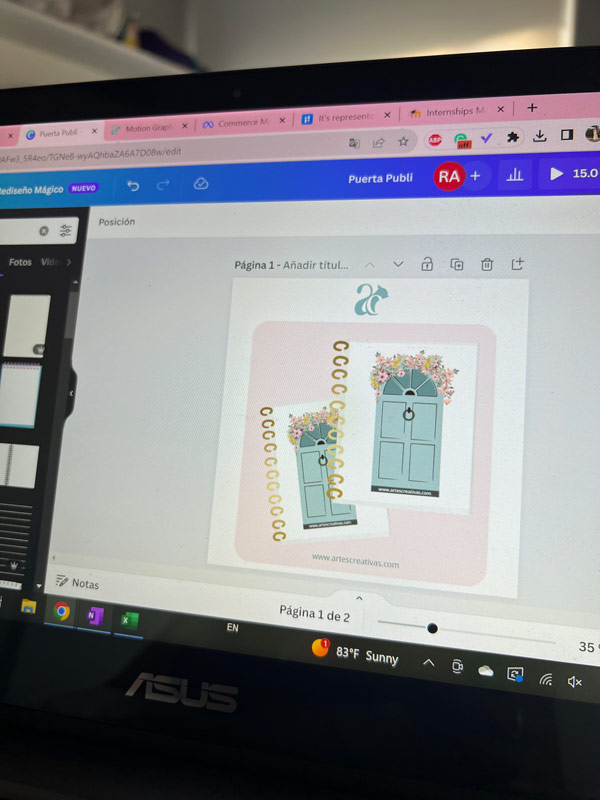
Designing social media posts to be used in the future is a great way to stay productive and allows me the opportunity to learn the tool of Canva.
4. Keep Account of Your Tasks and Experiences
Did you know the average day in Spain is longer than one in the United States? Well, at least it feels like it. With a schedule that puts dinner around 10 p.m., the days seem to have more minutes. This is great news for us interns! While 10 hours a week at my placement is totally achievable, it’s fortunate we also have ample free time to explore— and explore you must! From classes to placement hours to discovery time, the days take off at a full-on sprint.
This is where recommendation #4 comes in: write down your experiences. While it will be nice to recall the people you met, places you visited, and food you ate some years later, logging an account of your internship-related experiences and tasks will benefit you in the much nearer future as you update your resume and share experiences in interviews.
The internship time log, which I complete after each session at my placement, includes a small text box where you can scribe the activities you completed that day. I have found this incredibly helpful in documenting my tasks so I can later revisit them for accurate resume updates. I also have taken to journaling each week to further solidify my memories in and out of the office.
Skills sharpened: Organization, Discipline, Self-Reflection
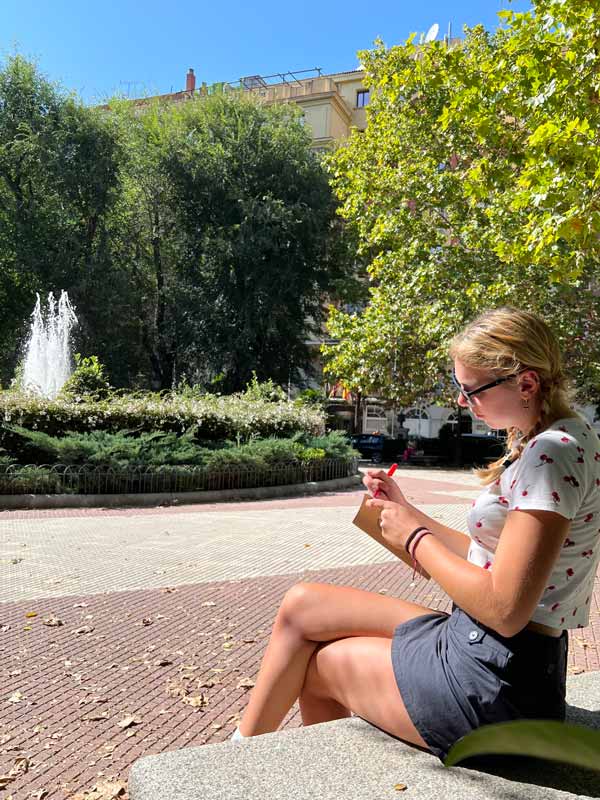
There are countless parks around the city which provide the perfect setting to reflect on and record my experiences from my internship and other adventures.
Interning abroad will give you a deeper immersion into your host culture and a different learning opportunity that you would miss without it. Participating in the professional sphere provides insight into a myriad of differing customs and expectations, widening your perspective and preparing you to succeed in future jobs. Undoubtedly you are already a great human with motivation and confidence but go for it! Take the leap! Your international internship placement eagerly awaits.








